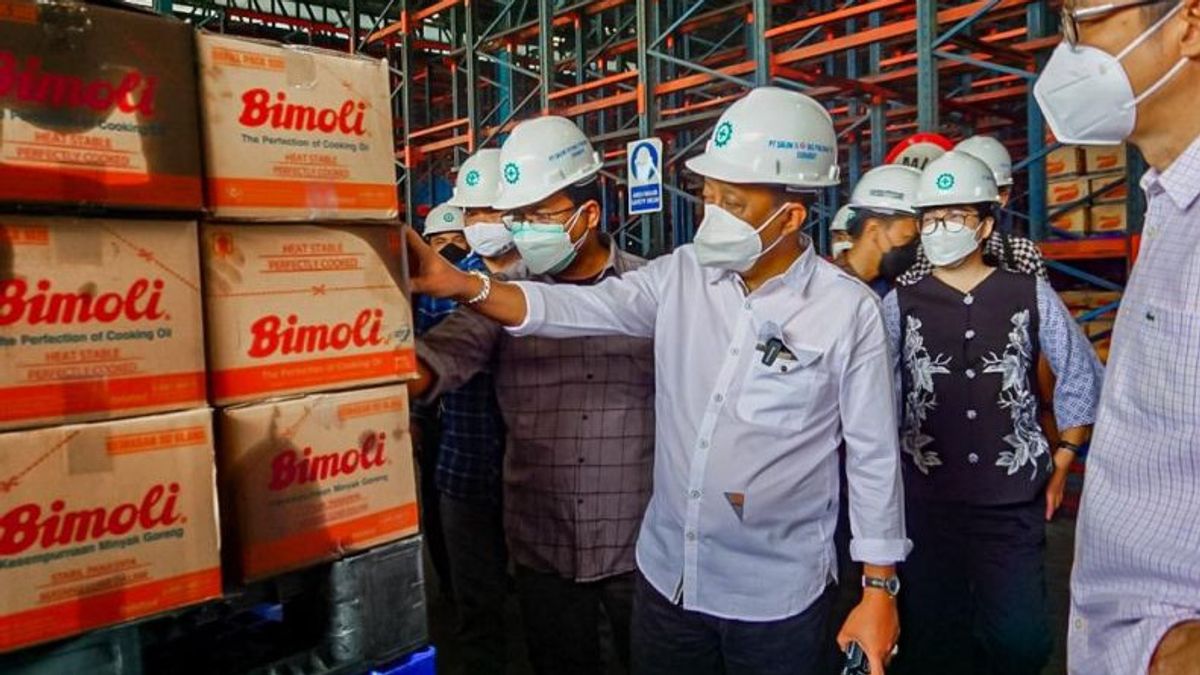JAKARTA - Cooking oil is currently still difficult to obtain, even the price is still above the highest retail price (HET) set by the Ministry of Trade. Therefore, Deputy Mayor of Surabaya, Armuji, conducted an inspection of the largest cooking oil factory in Surabaya, namely PT Salim Ivomas Pratama Tbk or SIMP, a cooking oil producer owned by conglomerate Anthony Salim.
For your information, SIMP Group produces three categories of palm oil-based cooking oil, namely (i) consumer branded cooking oil (ii) semi-consumer packaged cooking oil; and (iii) unbranded cooking oil for industrial use. SIMP Group's cooking oil products are marketed under the brands Bimoli, Bimoli Special, Delima and Happy.
The inspection carried out by Armuji is a step to ensure market conditions and the demand for cooking oil in the market can be met normally for the community. At the same time, to ensure there is no accumulation of oil.
During his visit, Armuji met with representatives of the management of PT SIMP Surabaya branch, East Java. Armuji then asked how the distribution of cooking oil is currently.
"Is the distribution smooth now?" he said, quoted from Armuji's YouTube channel, Friday, March 4.
A representative of PT SIMP's management explained that his party is currently still having problems with raw materials to supply cooking oil at a price of Rp. 14,000 as determined by the Ministry of Trade.
"We have problems with raw materials. The government determines the selling price in the market, right at Rp. 14,000. Now, the Ministry of Trade has calculated that producers can sell to end users, which is Rp. 14,000, if they are produced at a CPO price of Rp. 9,300. We haven't been able to get the Rp9,300 yet," he said.
Therefore, PT SIMP cannot be optimal in producing cooking oil for supply to the market. This is because the price of CPO obtained is much higher, namely Rp. 16,000. This causes producers to lose money.
"We buy CPO whose market price is up to IDR 16,000, if we buy it for IDR 16,000, the selling price is IDR 14,000 and making 1 kilogram (kg) of cooking oil takes about 2 kg of CPO. So normally we should sell 1 liter in the market Rp22 thousand," he said.
Armuji also ensured that the problem of cooking oil scarcity was due to the disrupted supply of raw materials from upstream.
"So that's what makes it not smooth. So you haven't got the upstream yet, huh?" asked Armuji.
Representatives of PT SIMP Tbk also explained that the problem was upstream. According to him, if problems at the upstream level can be resolved, it will run smoothly down to the downstream.
"From the upstream. While the downstream is torn down. We as a cooking oil factory are in the middle. If it doesn't go smoothly from upstream, it's going to be stuck downstream. We have conveyed everything to the ministry," he explained.
According to him, the CPO price of Rp9,300 should have been provided by factories selling exports. This is because the government has decided that CPO producers must meet domestic demand by 20 percent. However, the supply of CPO at a price of Rp. 9,300 is difficult to obtain. As a result, the price of CPO that should be issued by the factory has not been balanced.
However, PT SIMP Tbk received the latest news from the Director General of Domestic Trade at the Ministry of Trade, Oke Nurwan, that the government had issued a letter to CPO producing companies requiring them to issue a CPO price of Rp. 9,300.
"We want to see in the future the development of the road or not. If this is an automatic road, it will run, if it doesn't work, there are still obstacles. So we also can't produce optimally because it stops, if there is (a road). We never get the Rp9,300, we have to we bought the Rp. 16,000," he explained.
"We continue to supply with the condition that we lose money, but in limited quantities. We can't usually be rich. Because we bear this burden as much as we can. But we still prioritize our supply to Surabaya, East Java," he continued.
Hearing an explanation from the management of PT SIMP Tbk, Armuji concluded that the problem of scarcity and the soaring price of cooking oil was because raw materials were obtained at an expensive price of Rp. 16,000.
"So the upstream must be completed first. If the upstream is completed, production will be smooth. Yes, it's just a policy that the price is Rp. 9,300, which means yes. If the price (CPO) is Rp. 9,300, it means that sales (of cooking oil) can be Rp. 14,000 (per liter)," said Armuji.
The English, Chinese, Japanese, Arabic, and French versions are automatically generated by the AI. So there may still be inaccuracies in translating, please always see Indonesian as our main language. (system supported by DigitalSiber.id)













